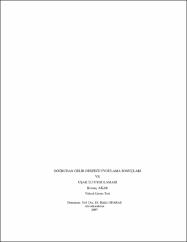Doğrudan Gelir Desteği Uygulama Sonuçları ve Uşak İli Uygulaması
Özet
Çalışmada, bütçenin gider kalemleri içinde önemli bir yeri olan tarımsal destekleme ödemelerinde yapılan reform çalışmalarında gelinen son nokta olan doğrudan gelir desteği sistemi incelenmektedir. Tarımsal yapıdaki gelişmeler Osmanlı İmparatorluğundan Cumhuriyet dönemine kadar incelenmiş, günümüzdeki yapısal sorunların kaynaklarına değinilerek, bu sorunların çiftçi kesimi üzerindeki olumsuz etkilerini azaltmayı amaçlayan tarımsal destekleme çalışmalarına değinilmiştir. Tarımsal destekleme politikalarının gerek siyasi rant malzemesi olarak kullanılması, gerekse küçük çiftçi kesimine istenen düzeyde ulaşamaması sonucu, 1999 yılında IMF’ye verilen niyet mektupları doğrultusunda, Bütçe üzerinde yükü büyük ama etkisi az olan destekleme politikalarına son verilerek uygulamaya konulan doğrudan gelir desteği sisteminin amaçları ve uygulama sonuçları Uşak ilinde yapılan amprik çalışma ile değerlendirilmiştir. Doğrudan gelir desteği sisteminin, geniş bir kesimin faydalanması, çiftçilerin kayıt altına alınması gibi hedeflere uygun, olumlu yönlerinin yanında, ödemelerin üründen bağımsız olması nedeniyle üretimle ilgili amaçları karşılamadığı, arazi büyüklüğüne göre yapılması nedeniyle küçük çiftçi kesiminin daha düşük düzeyde yararlandığı yönünde olumsuz yönleri de bulunmaktadır. Ürün bazında farklı tutar belirlemek suretiyle tarımsal üretim politikalarının oluşumunda önemli bir yönlendirme aracı olarak kullanılabileceği ve uygulamanın ilk beş yılındaki kayıtlar doğrultusunda sadece küçük çiftçilerin faydalanması yönünde düzenleme yapılmasının destekleme amaçlarına daha uygun olacağı sonucuna varılmıştır. In this study, the system of direct income support, the final level of reforms about the agricultural support payment which constitutes one of the most important expense items of the budget, is analysed. The development of agricultural structures from the Ottoman Empire to the Republican Era is analysed, the sources of the current structural issues are mentioned and the agricultural support studies aiming to decrease the negative effects of such issues over the farmers are examined. Since the agricultural support policies were not only used for political abuse but also were not able to access the small farm enterprises precisely; the ineffective support policies heavy for the budget were abated and instead of them direct income support system was introduced in line with the letter of intents presented to IMF in 1999. In this study, the objectives and the results of the application of this newly introduced direct income support system are examined through an empirical study implemented in Uşak. Besides the direct income supports system’s positive aspects such as enabling higher number of people to drive benefit and fulfilling the objectives like keeping the record of the farmers; it also has some other aspects that need betterment. This study reveals that the system does not fulfill its purpose about the production since the payments are decoupled from the product, and that small farm enterprises cannot fully benefit from the system since the income support is granted according to the size of the land in thousand square meters. It is also argued that the system can be used as a powerful means of determining the agricultural production policies by setting a different price for each product; and with respect to the records of the first five years, the legal arrangements letting the small farm benefit from the system may fulfill the aim of this support system.
Bağlantı
http://hdl.handle.net/11630/3027Koleksiyonlar
- Yüksek Lisans Tezleri [1638]



















